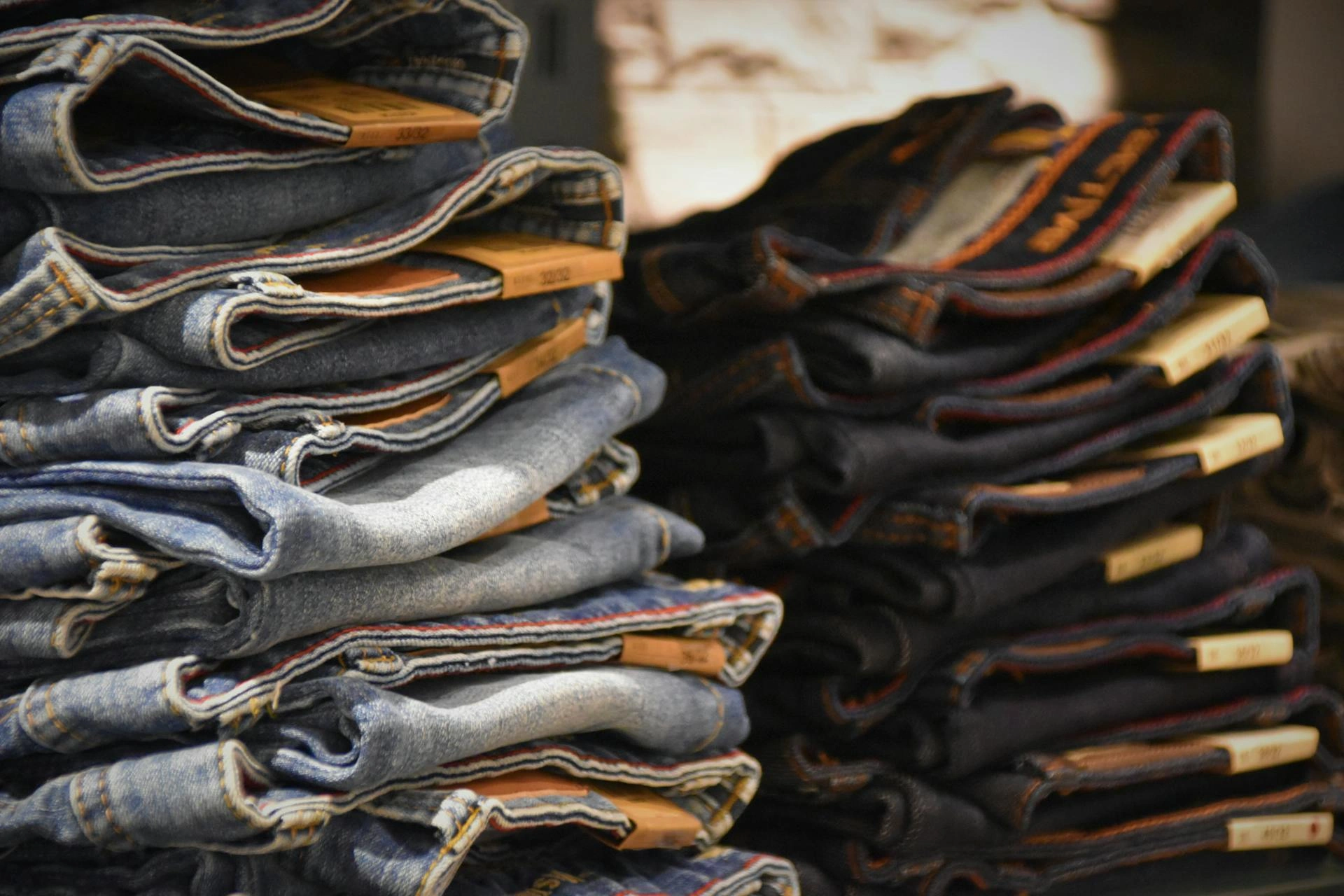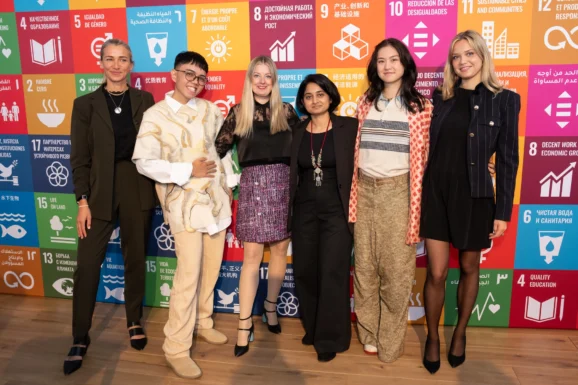Redress and UN network call for fashion industry to meet sustainability goals

John E. Kaye
- Published
- News, Sustainability

Fashion is under pressure to clean up its supply chains, with campaigners warning that the sector lags behind on climate and social targets. At the UN General Assembly in New York, Redress and the UN Fashion and Lifestyle Network set out how designers are trying to close the gap
Fashion’s environmental impact was in the spotlight at the United Nations General Assembly in New York yesterday, where Hong Kong-based non-profit Redress announced it had joined the United Nations Fashion and Lifestyle Network (UNFLN).
The two organisations co-hosted a panel in the Assembly’s SDG Media Zone with designers from India, the Philippines and the United States, urging the industry to move faster on sustainability.
They said fashion remained one of the world’s most polluting industries, producing up to 8 per cent of annual greenhouse gas emissions and around 9 per cent of ocean microplastic pollution.
Redress said the sector was lagging behind on climate and social targets, citing research by McKinsey & Company and the Business of Fashion that suggested many executives were prioritising other opportunities over sustainability.
Smaller brands, the group argued, were already showing how supply chains could support the UN’s Sustainable Development Goals.
Christina Dean, founder of Redress, told the event: “Fashion must be more than just creativity and commerce. Fashion needs more of an ethical heart and soul to address our planetary challenges. There are countless inspiring brands globally making more than just clothes; they are making positive impacts at various Sustainable Development Goals. From consumers to investors, we must spotlight and empower these businesses to give them a rightful seat at the global fashion table.”

The panel featured Indian fashion designer Damini Mittai, Filipino fashion house founder Jann Christian Lim Bungcaras, and U.S-based artist Isabella Li Kostrzewa.
Mittai, who runs the Koaka Collective in India and works with rural women to create jobs and build skills, said: “My work with marginalised female rural communities in India aims to foster sustainable livelihoods through skills-building and collective action, working against gender equality and the injustice of climate change.”
Bungcaras, who runs a fashion house in the Philippines, added: “The Philippines is awash with a modern textile waste colonialisation, from post consumer to industry waste, and as a developing country, we should not be seen as a dumping ground for waste.”
Alongside the discussion, a wider group of Redress Design Award alumni also joined the UNFLN. They included Aashita Jain (India), Ruyin Tian (China), Aarushi Kilawat (India), Ruwanthi Gajadeera (Sri Lanka), Lívia Aguiar de Castro (Brazil), Louise Boase (Australia), Rachel Clowes (UK), Rose Brown (UK), Magdalena Malbran (Argentina) and Silvia Acién Parrilla (Spain).
Redress said Asia, which accounts for around 60 per cent of global garment and textile exports and employs an estimated 60m workers in the sector, would remain the central focus of its work.
The UN and World Meteorological Organization have also warned that Asia is heating faster than the global average, making it especially exposed to climate risks.
Kerry Bannigan, co-founder of the UNFLN, added: “As the United Nations Secretary-General reminded us on the International Day of Zero Waste, fashion must make good sense for both people and planet. Fashion significantly influences numerous aspects of society, from employment and gender equality to innovation and cultural expression. The choices we make in this sector today profoundly affect the world we live in tomorrow.”
READ MORE: ‘World Coastal Forum leaders warn of accelerating global ecosystem collapse’. The World Coastal Forum opened in Yancheng with global leaders calling for urgent action on coastal protection and green growth. The European’s Editor-at-Large, Stanley Johnson, was among the delegates
Do you have news to share or expertise to contribute? The European welcomes insights from business leaders and sector specialists. Get in touch with our editorial team to find out more.
Main image: Stacks of denim jeans, one of the most resource-intensive products in the global fashion industry. Credit: Waldemar Brandt/Pexels
RECENT ARTICLES
-
 Europe’s leading defence powers launch joint drone and autonomous systems programme
Europe’s leading defence powers launch joint drone and autonomous systems programme -
 Euro-zone business activity accelerates as manufacturing returns to expansion
Euro-zone business activity accelerates as manufacturing returns to expansion -
 Deepfake celebrity ads drive new wave of investment scams
Deepfake celebrity ads drive new wave of investment scams -
 WATCH: Red Bull pilot lands plane on moving freight train in aviation first
WATCH: Red Bull pilot lands plane on moving freight train in aviation first -
 Europe eyes Australia-style social media crackdown for children
Europe eyes Australia-style social media crackdown for children -
 These European hotels have just been named Five-Star in Forbes Travel Guide’s 2026 awards
These European hotels have just been named Five-Star in Forbes Travel Guide’s 2026 awards -
 McDonald’s Valentine’s ‘McNugget Caviar’ giveaway sells out within minutes
McDonald’s Valentine’s ‘McNugget Caviar’ giveaway sells out within minutes -
 Europe opens NanoIC pilot line to design the computer chips of the 2030s
Europe opens NanoIC pilot line to design the computer chips of the 2030s -
 Zanzibar’s tourism boom ‘exposes new investment opportunities beyond hotels’
Zanzibar’s tourism boom ‘exposes new investment opportunities beyond hotels’ -
 Gen Z set to make up 34% of global workforce by 2034, new report says
Gen Z set to make up 34% of global workforce by 2034, new report says -
 The ideas and discoveries reshaping our future: Science Matters Volume 3, out now
The ideas and discoveries reshaping our future: Science Matters Volume 3, out now -
 Lasers finally unlock mystery of Charles Darwin’s specimen jars
Lasers finally unlock mystery of Charles Darwin’s specimen jars -
 Strong ESG records help firms take R&D global, study finds
Strong ESG records help firms take R&D global, study finds -
 European Commission issues new cancer prevention guidance as EU records 2.7m cases in a year
European Commission issues new cancer prevention guidance as EU records 2.7m cases in a year -
 Artemis II set to carry astronauts around the Moon for first time in 50 years
Artemis II set to carry astronauts around the Moon for first time in 50 years -
 Meet the AI-powered robot that can sort, load and run your laundry on its own
Meet the AI-powered robot that can sort, load and run your laundry on its own -
 Wingsuit skydivers blast through world’s tallest hotel at 124mph in Dubai stunt
Wingsuit skydivers blast through world’s tallest hotel at 124mph in Dubai stunt -
 Centrum Air to launch first European route with Tashkent–Frankfurt flights
Centrum Air to launch first European route with Tashkent–Frankfurt flights -
 UK organisations still falling short on GDPR compliance, benchmark report finds
UK organisations still falling short on GDPR compliance, benchmark report finds -
 Stanley Johnson appears on Ugandan national television during visit highlighting wildlife and conservation ties
Stanley Johnson appears on Ugandan national television during visit highlighting wildlife and conservation ties -
 Anniversary marks first civilian voyage to Antarctica 60 years ago
Anniversary marks first civilian voyage to Antarctica 60 years ago -
 Etihad ranked world’s safest airline for 2026
Etihad ranked world’s safest airline for 2026 -
 Read it here: Asset Management Matters — new supplement out now
Read it here: Asset Management Matters — new supplement out now -
 Breakthroughs that change how we understand health, biology and risk: the new Science Matters supplement is out now
Breakthroughs that change how we understand health, biology and risk: the new Science Matters supplement is out now -
 The new Residence & Citizenship Planning supplement: out now
The new Residence & Citizenship Planning supplement: out now



























